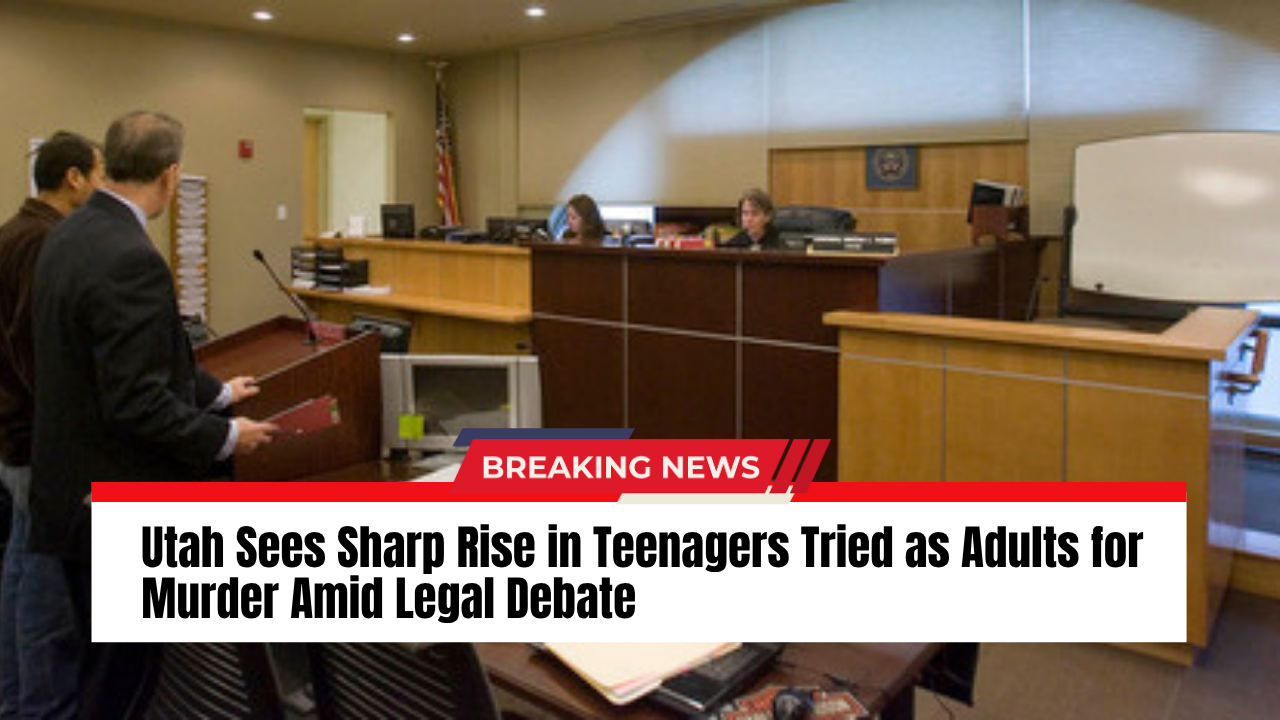Utah prosecutors and defense attorneys are taking notice as the state sees an unusual rise in teenagers charged as adults for murder. Within just the past month, four youths aged 15 to 17 have been arrested and booked into adult court, prompting discussion about whether the current legal approach properly balances accountability and rehabilitation.
Surge in Teen Murder Charges Across Utah
Law enforcement agencies across Utah have confirmed a growing number of homicide cases involving teenage suspects, including two recent shootings that claimed the lives of other minors. According to state data and police reports, Weber County has been at the center of this recent wave — an area not typically known for multiple juvenile homicide prosecutions within such a short timeframe.
These young defendants, if convicted, could potentially face decades — or even life — in prison under Utah’s adult criminal statutes.
KSL Legal Analyst Greg Skordas, a veteran defense attorney and former prosecutor, explained that while the law makes it possible to charge minors as adults in certain cases, this month’s concentration of such cases is particularly notable.
“It’s not uncommon for serious crimes like homicide to bypass the juvenile system,” Skordas told KSL NewsRadio. “But it is unusual to see so many teens from the same county being charged as adults around the same time.”
| Category | Number of Cases | Age Range | Location |
|---|---|---|---|
| Teen murder charges (October 2025) | 4 | 15–17 | Weber County, Utah |
| Victims under 18 | 2 | N/A | Northern Utah |
Utah Law: When Minors Are Tried as Adults
Under Utah’s criminal code, prosecutors can file certain serious charges directly in adult court, skipping the juvenile process entirely. The rule applies to 16- and 17-year-olds accused of aggravated offenses such as murder, aggravated robbery, and sexual assault.
“They don’t start in the juvenile court. They file directly in the adult court,” Skordas explained. “That’s part of our law that was developed several years ago in response to the gang problem.”
The Utah Department of Corrections and juvenile justice advocates say that the measure was originally meant to deter gang-related crimes committed by older teens. However, as youth-related violent crime fluctuates, questions are resurfacing about whether the law adequately reflects modern understanding of adolescent brain development.
“A lot of people feel like we should have that hard line at 18,” Skordas added, “because that’s the point when a person’s brain and decision-making skills are considered more mature.”
Critics argue that teenagers tried as adults lose access to vital rehabilitation resources provided through Utah’s Division of Juvenile Justice and Youth Services. Once transferred to adult court, minors can face lengthy pretrial detention, adult sentencing, and a criminal record that follows them for life.
Balancing Accountability and Adolescent Development
The growing number of juvenile homicide cases has renewed debate among Utah lawmakers, educators, and social workers. Many point to social pressures, gang activity, and access to firearms as key contributors to violent behavior among youth.
Weber County’s cluster of cases suggests potential local issues, but experts caution against broad conclusions without deeper investigation. “We try to look at those on a case-by-case basis,” Skordas noted. “But when it’s a homicide — a murder — and the offender is 16 or 17, you can be almost assured that those will begin right out of the chute in adult court.”
Advocates for criminal justice reform, including members of the Utah Juvenile Defender Attorneys Association, have called for more discretion in determining which cases move to adult court. They argue that developmental science supports rehabilitative justice for minors, even in serious offenses, given their capacity for change and growth.
On the other hand, some prosecutors and victims’ families say the gravity of homicide requires adult-level accountability. They cite public safety, deterrence, and the trauma caused to victims’ families as justification for strict sentencing.
Community Reaction and Future Outlook
In Weber County and neighboring regions, community members have expressed shock at the number of teens now facing potential life sentences. Local officials, including the Weber County Attorney’s Office, have emphasized that each case undergoes individual review based on the facts, age, and intent of the accused.
Utah’s Juvenile Justice Oversight Committee is reportedly monitoring these developments and may revisit statutes concerning mandatory adult filings in violent cases.
The debate has also reached classrooms and parent organizations. Teachers and counselors across Utah are urging proactive intervention programs to steer at-risk youth away from violence through mentoring, early counseling, and education on conflict resolution.
As Utah continues to wrestle with this issue, policymakers face the challenge of balancing justice, rehabilitation, and community safety. Whether the state will reconsider its approach to juveniles charged with adult crimes remains uncertain — but the surge in cases has undeniably reignited public concern.



